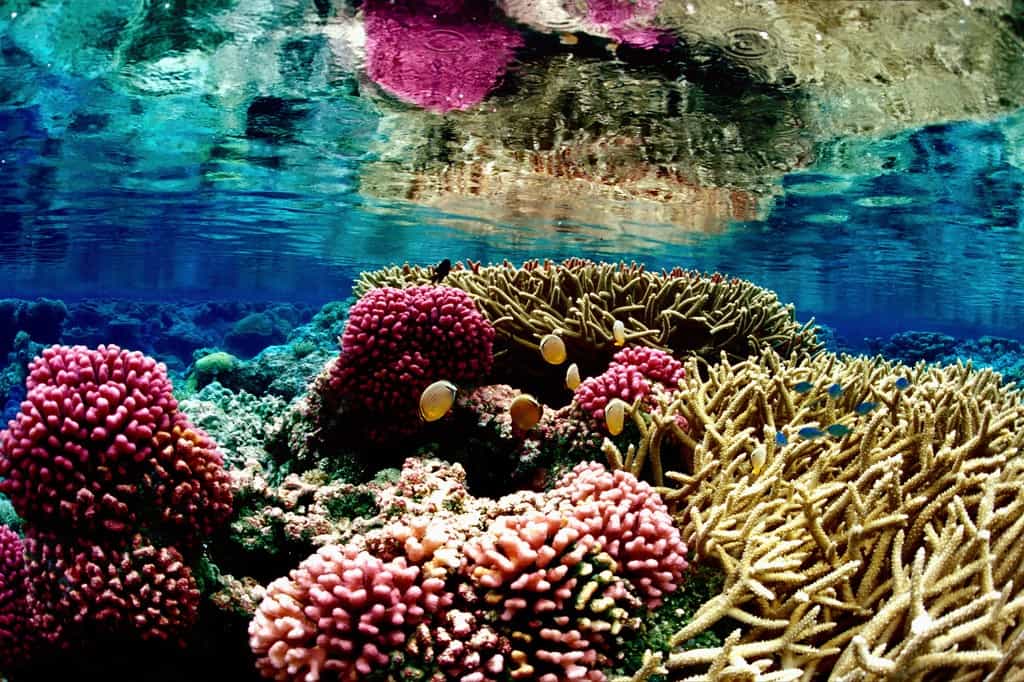
Global Warming and Coral Reefs are two topics very closely related. Do you snorkel or dive? Have you seen the world underneath the water surface?
It is like leaving the world as we know it and entering another one – a much cleaner and more beautiful world full of the most interesting species, species you sometimes cannot even imagine.
Do you think it is worth saving that world?
Do you know what its biggest threats are?
If yes, email us. If not, then read on.
Let’s start with a no-brainer: burning coal, oil and gas adds carbon dioxide to the atmosphere, the same gas used to give soft drinks fizz. So far, so good.
However, just as carbon dioxide is absorbed into the drink, ocean water absorbs it from the air. When the carbon dioxide enters the ocean, it makes the water more acidic. That interferes with the ability of coral to calcify their skeletons:
They can no longer grow and begin to die.
Long after warming oceans caused the worst coral die-off on record, coral reefs are still unable to recover. In 1998 an El Niño weather pattern sparked the worst coral-bleaching event ever observed. Now, this is something we feel really strongly about – in one year alone, 16 percent of the world’s coral reefs was wiped out!
A sea temperature change of a mere one degree Celsius would yield similar losses to the events in 1998. Increasing levels of carbon dioxide in the water cause additional damage to corals, leaving them defenseless against storm damage and erosion.
Small but prolonged rises in sea temperature force coral colonies to expel their symbiotic, food-producing algae, a process popular as bleaching. While the dying reefs, which turn ghostly white, can recover from such events, many do not. Many reefs have been reduced to rubble, a collapse that has deprived fish of food and shelter.
Higher sea temperatures from global warming have already caused major coral bleaching events. Bleaching occurs when corals respond to the stress of warmer temperatures by expelling the colorful algae that live within them.
Some coral are able to recover, but too often the coral dies, and the entire ecosystem for which it forms the base, virtually disappears.
Causes of Coral Reefs Bleaching
- Anomalously high water temperature
- Anomalously low water temperature
- High levels of solar irradiance
- Combined solar radiation-temperature stress
- Reduced salinity
- Bacterial infections
- Increased sedimentation
- Exposure to toxic substances
Longer-lasting and more extensive bleaching events are already on the rise, with further increases coming in the decades ahead as ocean temperatures continue to rise due to global warming.
Warmer waters will increase the incidence of other coral diseases such as black band disease, white band disease, white plague, and white pox, all of which can lead to mass mortality of coral, and subsequently the entire ecosystem it supports.
Ocean acidification – which occurs when oceans absorb carbon dioxide from the atmosphere – is also a threat to coral. As the oceans become more acidic, the corals’ ability to form skeletons through calcification is inhibited, causing their growth to slow. A doubling of atmospheric carbon dioxide will reduce calcification in some corals by as much as 50 percent.
Coral reefs are critical because they act as hatcheries and nurseries for open ocean fish. They also protect coasts from storms, and provide fish, recreation and tourism income. In fact, estimates show that coral reef fisheries in developing countries feed billions of people. The total economic value of coral is in the area of $30 billion.
What Can You Do
Just as in many other cases, we can help global warming and coral reefs by following some rules:
- Volunteer with local organizations working to clean up local waterways. The health of all waterways – rivers, lakes and bays – ultimately affects the ocean.
- Help slow global warming by conserving energy, which includes using energy-efficient lighting and appliances and using mass transportation whenever possible
- Never anchor on a reef.
Environmental disasters have happened several times throughout the history of earth but never has human impact been so central in exacerbating one.
Coral reefs have survived all of the previous disasters, would they survive this imminent one, caused largely by us humans?
Watch EarthTouch‘s video on Coral Reefs and Climate Change.
Credit: Excerpts from USAToday and “Global Warming and Coral Reefs”, National Wildlife Federation
Check out our articles on Coast Coral Tree, Global Warming: Undeniable
